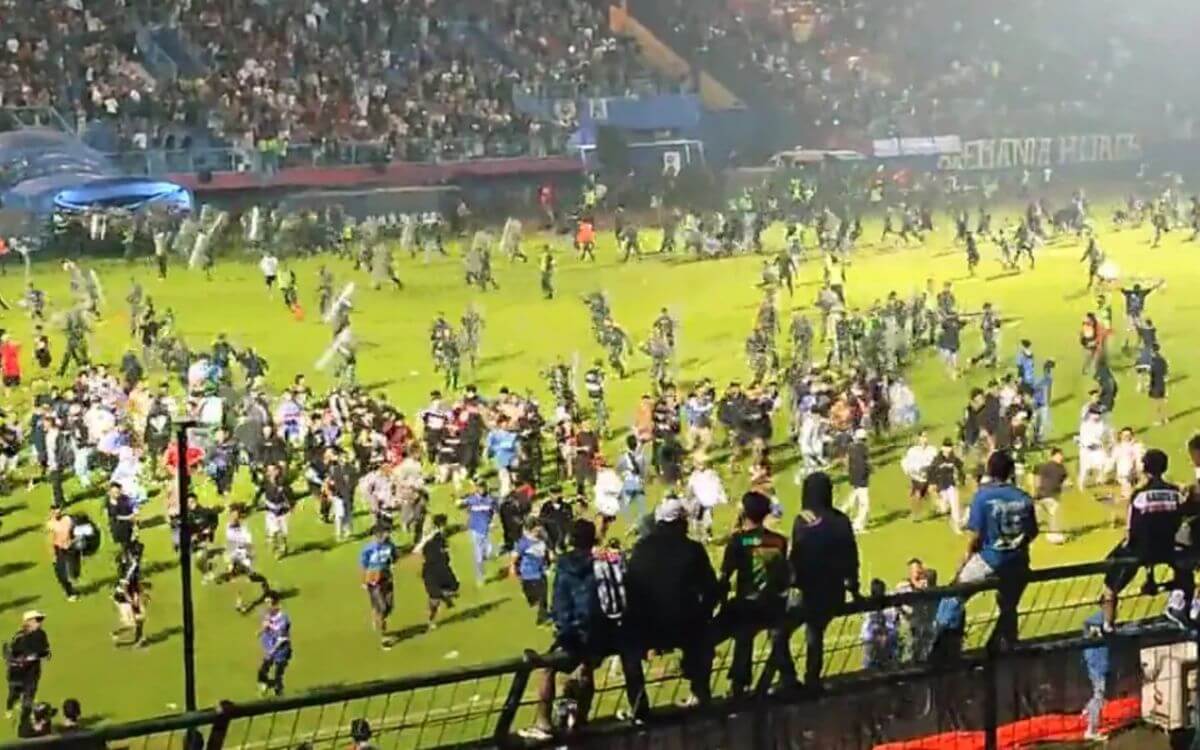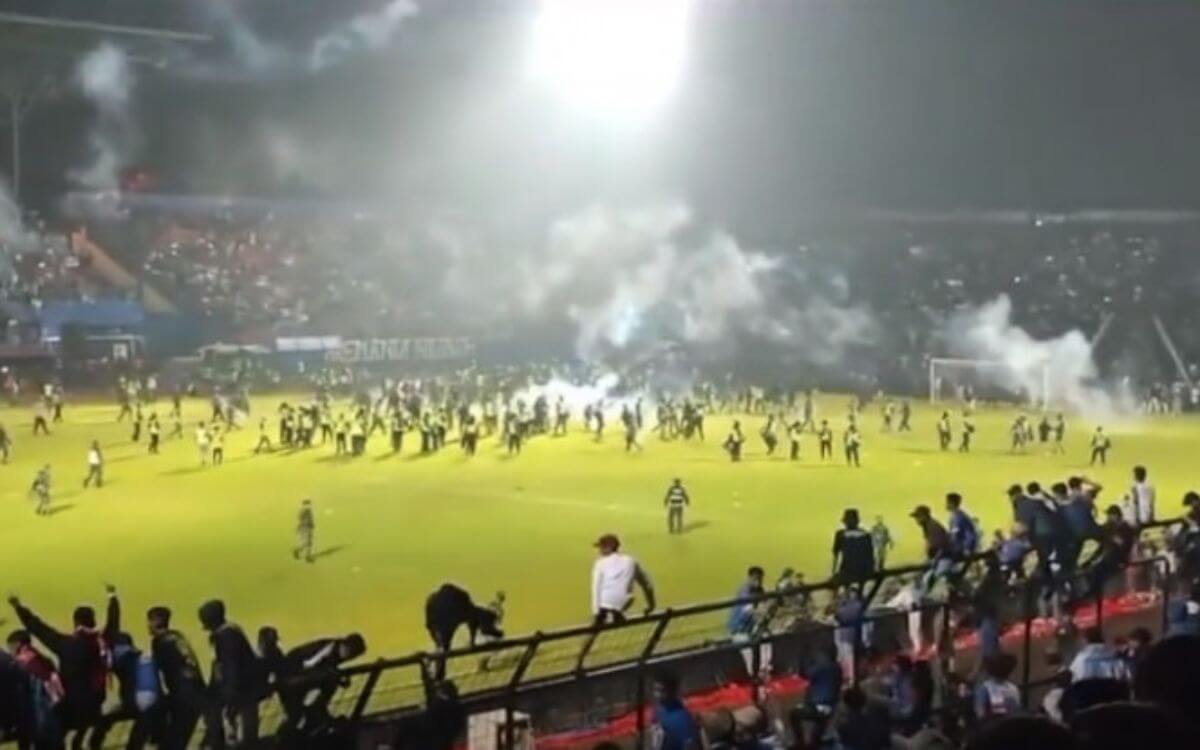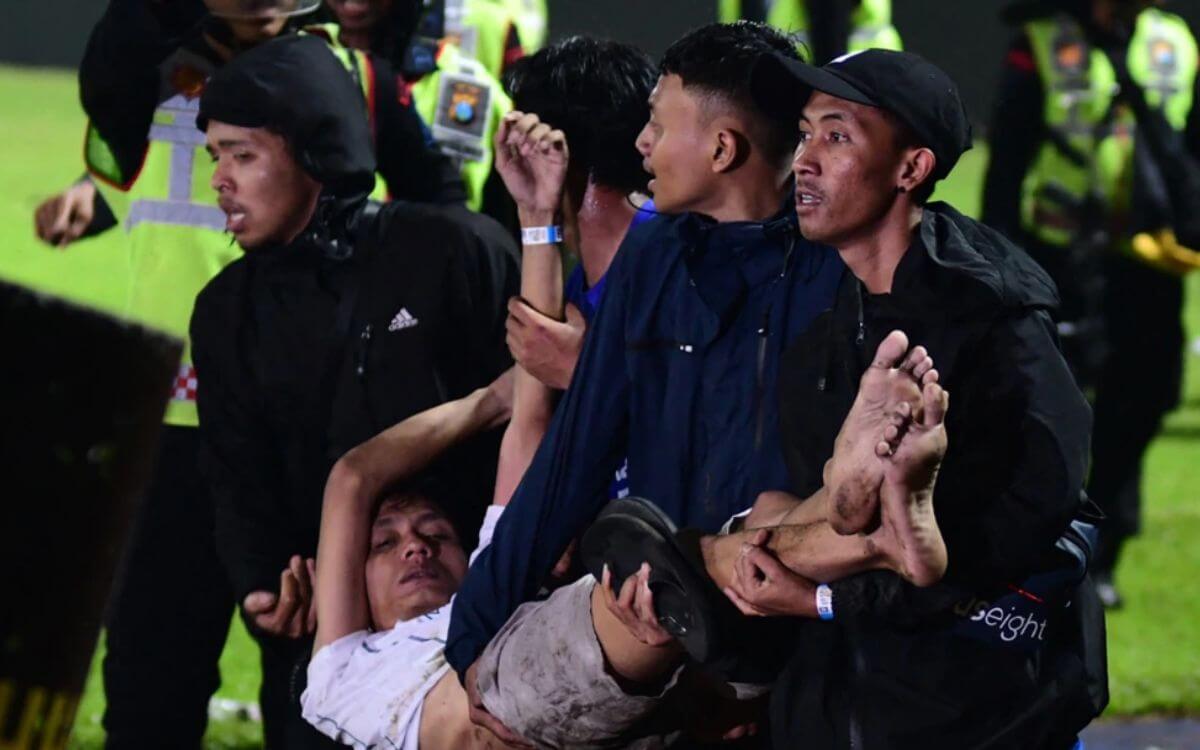At Least 125 Died At Indonesia Football Match Stampede
In what appears to be one of the deadliest stadium tragedies in history, a minimum of 125 people were confirmed dead and over 300 injured after a soccer match in Indonesia. Panicked supporters were trampled and crushed as they attempted to depart a brawl.
After authorities examined the number of fatalities across ten hospitals, the toll was reduced from a creative tally of 174 by East Java Deputy Governor Emil Dardak.
Indonesia Football Match Stampede

After Persebaya Surabaya’s 3-2 victory over Arema Malang in the Indonesian Premier League, local news networks captured images of fans pouring onto the field in the stadium in Malang.
Thousands of fans stormed the field after the game, throwing bottles and other items at players and officials in frustration. East Java police commander Nico Afinta told reporters that once the crowd reacted, the authorities shot tear gas, causing a stampede and some incidents of asphyxia.
According to reports, hundreds of people fled to an exit gate to escape the tear gas. Some people died in the commotion, while others were crushed.
Injuries were treated by more than 300 people who were brought to surrounding hospitals, but many of them passed away on the way there or while receiving care, according to Mr. Afinta.
He claimed that among the dead were at least two police officers. According to the director of one of the local hospitals caring for the injured, a five-year-old child was among the deceased, who told the news that some of the casualties suffered brain injuries.

Social media videos showed a stampede of spectators entering the field. Police with shields and batons later charged onto the field and into the crowd. People were spotted attempting to flee the field while being kicked and struck with batons by police.
The air on the field and stadium is then filled with tear gas. Images depict people being taken away by other fans who looked to have lost consciousness. Numerous local news organizations published a film showing the scene from different angles, examining potential safety issues.
Joko Widodo, the president of Indonesia, urged officials to verify match security carefully and expressed the hope that this would be “the final football tragedy in the country.”
Mr. Widodo also gave the Football Association of Indonesia the order to halt all matches in the top-tier BRI Liga 1 competition in Indonesia until an inquiry was finished.
According to FIFA, the organization that oversees international football, no guns or “crowd control gas” should be carried or deployed by stewards or police.
At Least 125 People killed, And 300 Injured
East Java police did not respond immediately to a request for comment regarding whether they were aware of such rules. Still, the commissioner of Indonesia’s human rights commission told the news that the commission planned to look into security on the ground, such as the deployment of tear gas.
Mahfud MD, the nation’s top security official, claimed in an Instagram post that the stadium was overflowing. He claimed that 42,000 tickets had been distributed despite the stadium’s capacity being only 38,000.

East Java Governor Khofifah Indar Parawansa informed reporters that the families of the deceased and the injured would receive financial assistance. Strong rivalries between teams have occasionally resulted in fan violence at games in Indonesia, and there have been incidents of problems there before.
Following altercations between supporters of the two competing clubs in February 2020 that resulted in damages totaling over $25,000, Persebaya supporters were prohibited from the game.
Hooliganism is common in Indonesia, a soccer-obsessed country where fervor frequently results in bloodshed, as in the case of a Persija Jakarta, a fan who was killed by a mob of fervent Persib Bandung supporters in 2018.
Despite Indonesia’s lack of recognition in the sport on the international stage, hooliganism is rampant in the nation.
Fierce rivalries
These outbursts and fan-induced situations are frequently prompted by ferocious rivalry. Historically, there has been disorder at sporting events in Indonesia, and fierce rivalries between teams have occasionally resulted in fan violence.
Stadiums are packed, but the 275 million-person nation of Indonesia’s football landscape has been marred by hooliganism, draconian law enforcement, and poor administration.
Indonesia’s Minister of Sports, Zainudin Amali, informed the media that the Ministry would reassess stadium safety, including the possibility of banning fan entry.
Fans around the world have been frightened by recurring stadium mishaps. At the Estadio Nacional, 328 people perished in a crash when Peru played Argentina in 1964.
In a 1989 British tragedy at the Hillsborough Stadium in Sheffield, an overcrowded and fenced-in enclosure collapsed, killing 96 Liverpool fans.
FIFA U-20 World Cup Status
In May and June next year, Indonesia is slated to host the FIFA under-20 World Cup. It is also one of the three nations vying to host the Asian Cup, the continent’s version of the Euros, in 2019, after China withdrew as the hosts.
In a statement, Shaikh Salman bin Ebrahim Al Khalifa, the president of the Asian Football Confederation, expressed his “deep sorrow and sadness” at the dreadful news coming out of football-crazy Indonesia and his sympathies for the victims, their families, and friends.
Police actions, particularly tear gas, in the tragic crash that left at least 125 people dead at a soccer event in Indonesia have come under scrutiny from human rights and law enforcement specialists.
The gas is an indiscriminate weapon that can harm large groups of people and creates acute burning sensations in the eyes, mouth, nose, lungs, and skin. Those not paralyzed will probably try to escape in whatever way they can.
Tear Gas Factor For Disasters
According to Owen West, a senior lecturer in policing at Edge Hill University in Britain, using tear gas is particularly dangerous in enclosed spaces like a football stadium when people have nowhere else to go.
People in crowds press against one another as they try to evacuate through constrained or even locked exits, resulting in tear gas becoming a factor in several recent stadium disasters.

According to FIFA, the international soccer governing body, no “crowd control gas” shall be carried or used by stewards or police officials in charge of security during games.
Tear gas “should be used only to disperse the crowd when civil strife has occurred and when all other tactics have failed,” according to Usman Hamid, executive director of Amnesty International for Indonesia.